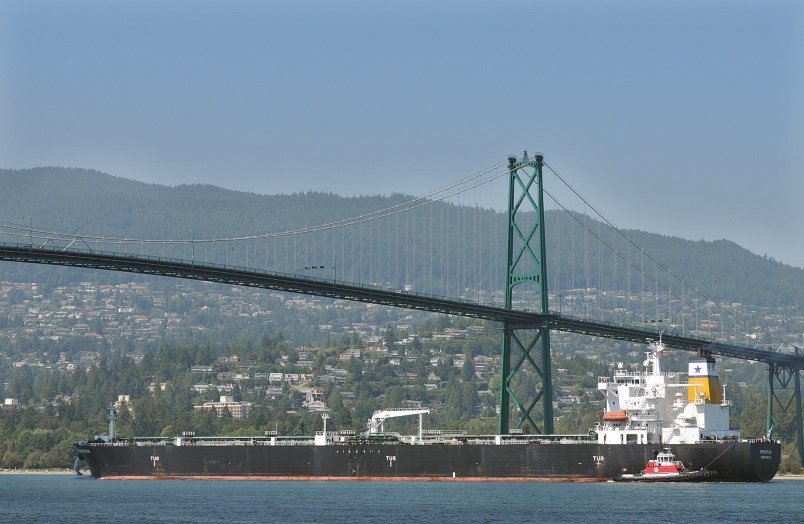I don’t know that I’ve ever read a 533-page book.
The name of the book?
It’s actually a report and I have yet to get through the whole thing. I doubt I ever will. I’m referring to the National Energy Board’s report on Kinder Morgan’s Trans Mountain Expansion Project, which was released May 19.
This is the report that concluded Kinder Morgan’s plan to build another pipeline to run almost parallel to its existing line from Alberta to the shores of Burrard Inlet is in “the public interest.”
In other words, the board believes Prime Minister Justin Trudeau and his cabinet should give the green light to Kinder Morgan to build the $6.8-billion project.
Some of the board’s reasons for approval include considerable government revenues, increased access to diverse markets for Canadian oil and thousands of construction jobs and hundreds of long-term jobs directly related to the project.
But that argument, as Vancouverites well know, has been drowned out by the sea of voices opposing the project, including Mayor Gregor Robertson, the Tsleil-Waututh First Nation, Greenpeace, David Suzuki and even Jane Fonda.
It’s an economy vs. environment battle that will conclude in the months ahead as both sides see who can shout louder and longer into the ear of Mr. Trudeau.
That’s where the board’s report comes in.
It will get the full attention of many eyeballs, with a comprehensive reading over of all 157 conditions the board recommended should be met before the federal cabinet could potentially high-five Kinder Morgan president Ian Anderson.
Fifty-eight of the conditions are related to the environment and 53 involve engineering and safety, all of which Anderson has said are “rigorous and appear to be achievable.”
But getting to high-five for the cabinet is going to be, as PR people are prone to say, a challenge. A political risky one, that is.
Consider the optics of a prime minister approving a pipeline after an election campaign in which he emphasized the importance of municipalities’ views; his first visit as prime minister to a municipality was Vancouver.
Also consider the PM spent his early days as Canada’s leader focused on improving relations with First Nations, including those who welcomed him with the gift of a model-sized canoe as he entered Vancouver city hall last December.
Much of the concern the mayor and anti-pipeline crusaders have with a new 987-kilometre pipeline is the effect that almost tripling the number of barrels of oil per day to Burnaby will have on tanker traffic in local waters.
In its report, the board made it clear that marine shipping is not part of the project and not regulated by the National Energy Board. Even so, the board said, it considered the potential environmental and socio-economic effects of an oil spill in local waters.
Here’s what the board concluded:
“The board is of the view that although a credible worst-case spill from a tanker associated with the project would result in significant adverse environmental and socio-economic effects, the probability of such an event is very low.”
The board based its conclusion on reviewing all the evidence before it, including the results of Trans Mountain’s marine shipping risk analysis and assessments conducted for Transport Canada and a panel of tanker safety experts.
The board does acknowledge increased tanker traffic will have “significant adverse effects” to Southern resident killer whales. It also acknowledges “the high degree of concern aboriginal groups have regarding potential spills or contamination of the rivers and ocean, and how it would affect their traditional use and cultural identity.”
But again, the board repeatedly says through much of the report, the probability of a spill or “worst-case event” is very low and the benefits of a new pipeline would “outweigh the residual burdens.”
You can read all about oil spills in chapter 14 of the report, where Dr. Lance Barrett-Lennard of the Vancouver Aquarium is also referenced, saying “a large spill could never be entirely or even largely contained, with even the best equipment, training and will in the world.”
Sobering stuff.
Which means Trudeau and his cabinet have a lot of reading to do before making a decision that will say a lot about the direction of the Liberal government and the country’s reliance on fossil fuels.
Others, meanwhile, may want to read an excerpt from Trudeau’s campaign literature on a “new plan for Canada’s environment and economy.”
It says: “The Liberal plan will ensure that Canada can tap into the economic opportunities of our environment and create the clean jobs of tomorrow. It will undo the damage done by Harper and give to our children and grandchildren a country even more beautiful, sustainable and prosperous than the one we have now.”
Whatever that means.
mhowell@vancourier.com
@Howellings



